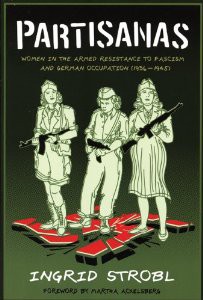This book examines the parts played by women in the struggle against fascism across Europe. Strobl acknowledges the importance of so-called “passive” resistance such as hiding people, distributing leaflets and listening for information on radio Moscow and the BBC, which is perceived as the traditional role of women in the resistance. However this book looks as the women who broke away from this traditional role and took part in the armed struggle against fascism.
As someone who didn’t know very much about what was happening in the different parts of Europe at this time I found this book accessible and informative.
Strobl has interviewed women from different counties to get a real insight into these women’s motivation and experiences. My one criticism would be the lack of interviews with anarchist women particularly in Spain. However several things that came across as important reasons why the communist women played the role they did would also be true of anarchist. Mainly being involved in communist groups educated them and gave them self-confidence and a belief in their equality with men so that when fascism threatened them they immediately took up resistance as it was in direct conflict with their new found freedom. It also gave them the confidence to break away from their traditional role and take up armed resistance. The fact that they were already part of a large network of people all of whom were opposed to fascism meant it was easy for them to form resistance groups with people they knew well and trusted.
Why are these heroic fighters not well known? Many of the women in this book were communists, Jewish or often both. Strobl suggests viewing Jews and women as passive non fighters and ignoring their resistance eases the consciences of those who did not resist. If mere woman and persecuted Jews in ghettos could fight why didn’t they?
One thing that struck me was how woman always seemed to have to work really hard to convince their male comrades that they were capable of armed struggle however once they had proved their ability within their resistance group they were generally respected by their colleagues. However this more enlightened view of women seemed to be lost after the war with many women returning to their traditional role of mother and housewife*, not receiving the same recognition as their male comrades. In fact, in Spain, it was frequently implied that the women on the front line were prostitutes.
Western Europe also ignored the part played by communist partisans as much as possible in favour of other groups. In Holland, Truust and Freddie Oversteegen were not decorated along with fellow partisans because they were communists. In France the work of the MOI (armed units of communist immigrant workers including many Jews and women) was ignored while the London backed Gaullist resistance got recognition. Resistance groups backed by governments in exile also got support (financial, military and logistic) from Britain and America. For example the Armia Krajowa in Poland, included many right wing anti-Semitic members, were an adjunct of the Polish government in exile. Despite all the help they received they had did little, believing armed struggle should only happen once the burden of military defeats, hunger and weariness brought the German people to the point of collapse. Meanwhile in the Polish ghettos Jewish resistance fighters were stealing and making whatever weapons they could to fight for their lives.
It seems to me this is another example of hiding the history that didn’t fit the narrative of the allied western governments. Sexist views, anti-Semitism and guilt which remained in people who were not involved in the struggle against fascism may have been used but the message that western governments wanted to portray was the Nazis were defeated by allied troops and resistance fighters who were working under their guidance. They wanted to forget all the resistance work done by autonomous groups or communists. This has resulted in hiding the actions of truly inspirational women who did more to prove sexual equality than selfish business women trying to break glass ceilings or this country’s only women prime minister, Margret Thatcher, who is now posthumously being hailed as a feminist icon by the right wing press despite doing nothing to help any women apart from herself.
*In Holland married women were prohibited from working after the war

Tim Bucknall
The Polish home army were the only Resistance group with a dedicated unit for saving Jewish Poles, Its unfair of you to throw the Anti-Semitic slur with no context or balance
The AK also supplied weapons for the Warsaw Ghetto uprising